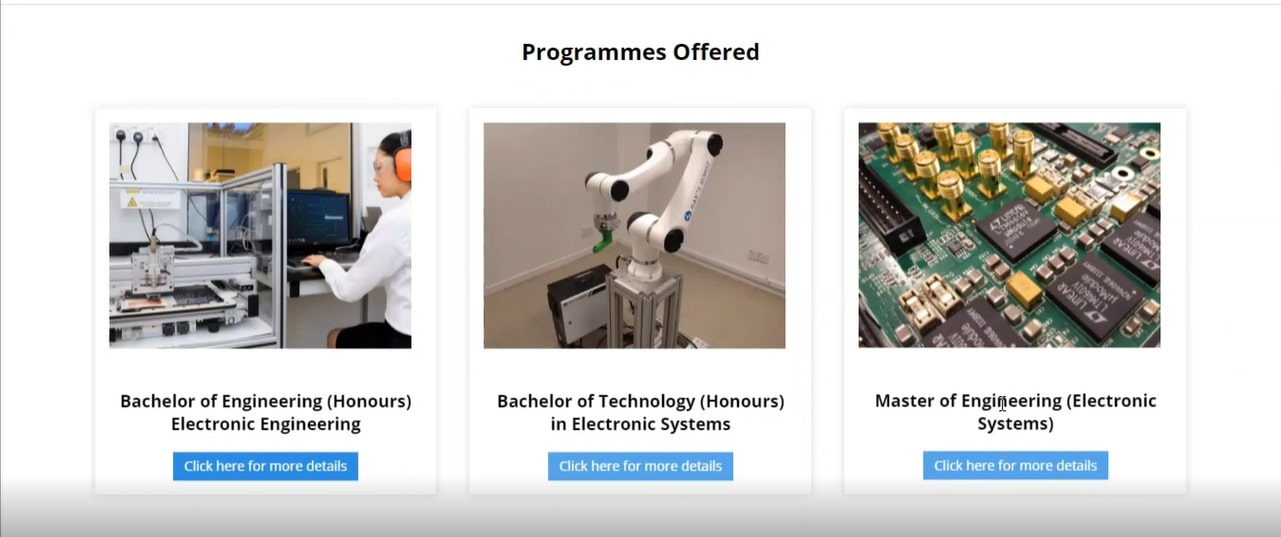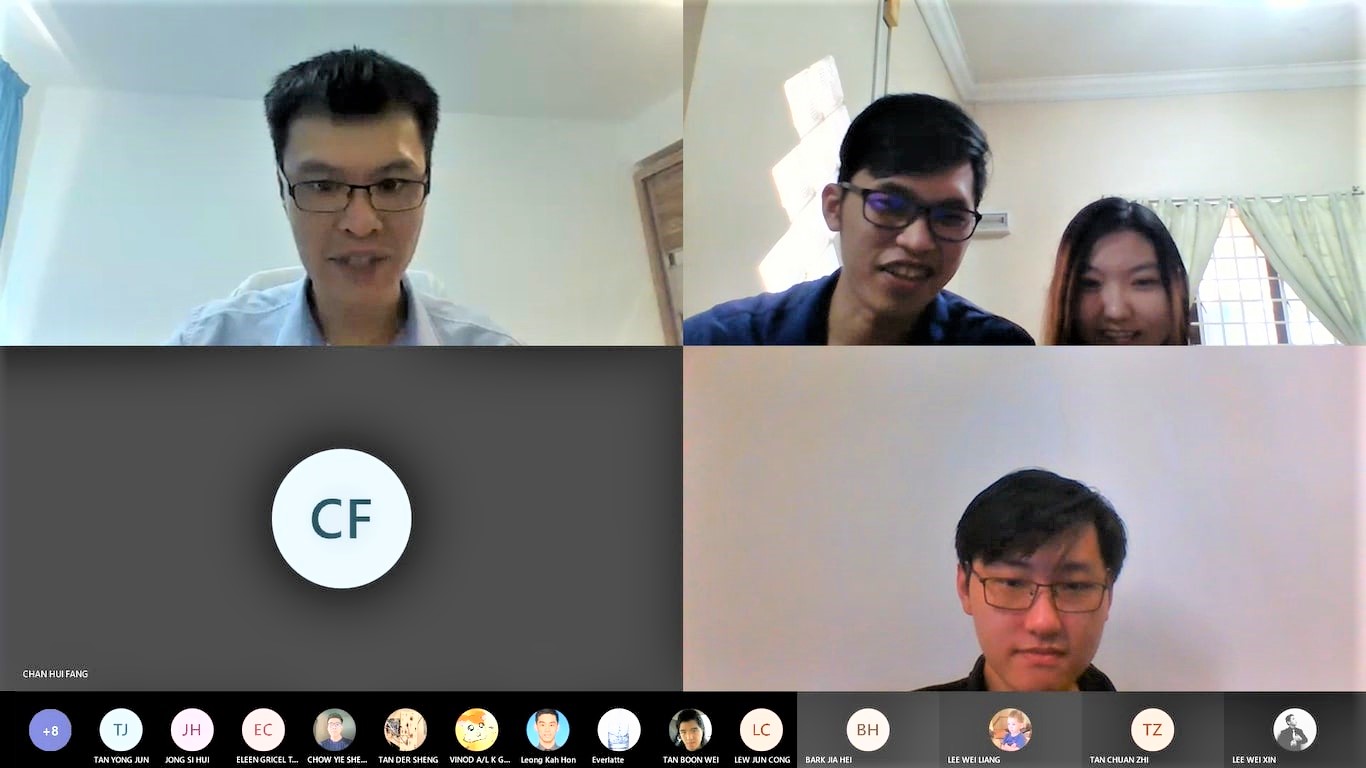
As our modern world runs on software, electrical and electronic devices, there will be an increasing demand for skilled software and hardware electronic engineers. To provide an insight into this career, the Department of Electronic Engineering parked under Faculty of Engineering and Green Technology (FEGT) organised a sharing session titled “FEGT Live Webinar: Electronic Engineering Insight” on 3 October 2020 via Microsoft Team. The webinar was moderated by FEGT Department of Electronic Engineering academic Dr Yew Tiong Keat.
With the aim to explain the career path of an electronic engineer to the public, the webinar provided a platform to get the recent updates of the job market in this field, especially during this pandemic situation. Besides that, the webinar also gave clearer ideas to the participants on what to expect if they enrol in the Electronic Engineering programme.
Invited to speak at the sharing session were UTAR alumni Dr Tan Shin Yinn, Pang Junn Min and Goay Fuh Yang. Dr Tan and Pang are currently working as Software Engineers at Intel Microelectronics, while Goay is working as a Software R&D Engineer in Pegatron Corporation, located in Taiwan.
Dr Yew kick-started the webinar by introducing the Bachelor of Engineering (Honours) Electronic Engineering and Master of Engineering (Electronic Systems) programmes offered under the Department of Electronic Engineering, UTAR. He also mentioned that UTAR is currently offering a new programme, namely Bachelor of Technology (Honours) in Electronic Systems under the Department of Electronic Engineering.
According to Dr Yew, the duration of study for Master of Engineering (Electronic System) is one year. The students could also consider taking a dual Master degree which only takes two years of study; one year in UTAR and another year in Germany.

Dr Yew introducing the programmes offered by UTAR Department of Electronic Engineering
According to Pang and Dr Tan, their jobs mainly required them to deal with programming tasks. Both of them agreed that the programmes offered in UTAR are always up-to-date. Pang found that the subjects and courses provided in UTAR are useful as his current job did apply what UTAR lecturers taught him before.
“I was able to catch up quite fast because I was exposed to the fundamentals during my study,” said Pang. Dr Tan added, “We learnt different types of programming languages during our bachelor degree. The concepts we learnt before are similar to the other programming languages which are used in the working place. Regardless of the languages we learnt, the concepts we learnt helped us to adapt and pick up our job scope.”
Speaking of how electronic engineering relates to software engineering, Pang explained that the syllabus of the UTAR FEGT programme is divided into hardware and software parts. The students can choose which parts to focus according to their own interests.
Reminiscing his life as a student in FEGT, Goay said that he liked to test what he had learnt from the textbook by using the facilities provided by UTAR. After learning the theories from the books, he will try to prove them technically by using the instruments in the lab. “I’m currently working as an R&D Software Engineer. I have to always prove what I have created by using the instruments which are similar to those I have used in UTAR before,” Goay said. He also encouraged more UTAR graduates to try their luck in searching for jobs in Taiwan as Malaysians have an advantage in language. To work in Taiwan, one must at least know how to read and write Chinese.
When asked about securing a job in the midst of the Covid-19 pandemic, the three speakers answered that the pandemic did not affect their work. According to Dr Tan and Pang, their job scopes still remained the same. Their company, Intel, is still hiring more people, especially those who are specialists in software engineering and electronic engineering. The only difference is having to work from home using their laptops. Goay’s company in Taiwan just hired four new staff during the pandemic period.
Sharing his opinion on the future of electronic engineering, Goay said, “I am not going to agree with the saying that this field would saturate because from what I have observed in Taiwan, more business ideas and job opportunities are coming out from this sector. In the next few years, I believe we will need more headcount in this sector.”
As the only female speaker at the webinar, Dr Tan encouraged more females to join the career. She said, “There are more and more females becoming software and hardware engineers. Many of my colleagues at Intel are ladies. Software and electronic engineering are not tough for females. So, as long as you have an interest in this career, you can join us.”
During the closing remark, Pang highly recommended students to enrol in UTAR. He told the participants that the school fee is reasonable and the facilities provided are good. According to Dr Tan’s study experience in UTAR, the lecturers are all very helpful. Goay advised, “I highly recommend UTAR. From my study experience, UTAR has provided strong fundamental study programmes that have always kept pace with the times. I believe the study scope in UTAR would help you in your future jobs.”

Clockwise from top left: Dr Yew, Pang, Dr Tan and Goay
© 2020 UNIVERSITI TUNKU ABDUL RAHMAN DU012(A).
Wholly owned by UTAR Education Foundation Co. No. 578227-M LEGAL STATEMENT TERM OF USAGE PRIVACY NOTICE